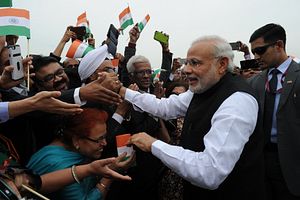Nuclear security has been a key issue for India for several decades, well before the world started paying greater attention to the subject after the September 11 terrorist attacks in the United States. Given the kind of neighborhood that India is in, securing nuclear and radiological materials from a range of internal and external challenges has remained a major preoccupation.
Such concerns shaped the Indian approach, which took the form of a number of institutional and legal measures, some of which go back to the 1960s. These measures have been periodically revised to adapt to the changing threat environment. Though the likelihood of an attack on a nuclear facility may be remote, the impact of such an attack could potentially be horrendous. This has led to greater official Indian attention leading to better interface between policy, regulation, and technology to implement a more effective security practice.
Even so, India is lagging in one area: the regulation of India’s nuclear sector. For example, India’s nuclear regulator, the Atomic Energy Regulatory Board (AERB), is not entirely independent of the Department of Atomic Energy, calling into question the independence of the AERB.
One critical step to address this has been the Nuclear Safety Regulatory Authority (NSRA) Bill that was initially tabled in the Indian Parliament in September 2011. The bill would have created a more independent nuclear regulator. However, with the country going into general elections, that bill lapsed and is yet to be reintroduced in the Parliament. The BJP government has not shown much inclination in attending to the NSRA bill, though it is critical of it for several reasons.
That is unfortunate. The passing of the bill and its consequences at home and abroad would be a major boost for India’s nuclear security. At home, setting up the NSRA would demonstrate the independence of its nuclear regulator, and that would certainly only improve the formulation of India’s nuclear security policies and practices. These additional steps are not difficult to establish either. India has already been practicing many additional measures, be it physical protection, nuclear transportation, or insider threats. However, India has yet to streamline these in a proper framework that is in line with international standards.
Abroad, India’s policies and the steps that it takes, especially on nuclear safety and security issues, are critical in strengthening India’s case for integration into the global non-proliferation architecture. As India once again makes its case for membership to the Nuclear Suppliers Group (NSG) in the December plenary, there is an opportunity for New Delhi to showcase its efforts in this regard.
India’s officialdom needs to understand that no country has a fool-proof security regime but as in nuclear safety, nuclear security regime will continually evolve and improve. In that context, taking up and passing the NSRA bill indeed will have positive impact both internally and externally. Internally, it will only improve the security, safety and regulatory practices. Externally, it is critical to strengthen India’s nuclear security credentials among the larger global nuclear community.
The sad part is that India does have a good story to tell when it comes to nuclear security policies and practices. What India seems to lack is the self-confidence about its own achievements in nuclear safety and security and be willing to engage and learn from others as well. India has an opportunity to take the lead especially since the Nuclear Security Summit process has come to an end.
Indian Prime Minister Narendra Modi has taken some initiatives, such as announcing that that India will be hosting a WMD Terrorism Summit in 2018. Not much has been heard about the summit since the announcement but it is believed that India might be holding the Summit sometime early next year. With election around the corner, its prospects, along with that of the NSRA, remain in doubt.
This is why it is essential that before its term ends, the Modi government must go ahead and table the NSRA bill. In addition to replacing the AERB, the bill seeks to establish a Council of Nuclear Safety (CNS) under the leadership of the Prime Minister. This is a significant improvement over the existing AERB structure.
Of course, there are issues with how things will move forward. There are still many who question the independence and autonomy of the regulator even with a new NSRA. In response, the Modi Government undertook a series of inter-ministerial meetings to write a new draft of the NSRA bill back in 2015, but it is yet to see daylight.
But the fact remains that in whatever form an NSRA Bill is introduced, it will still be a big step forward in having a legally autonomous nuclear regulator, similar to ones that exist in countries like France, the United Kingdom and the United States. The key question now is whether this government will prioritize nuclear security and take up the Bill before the next general election.

































